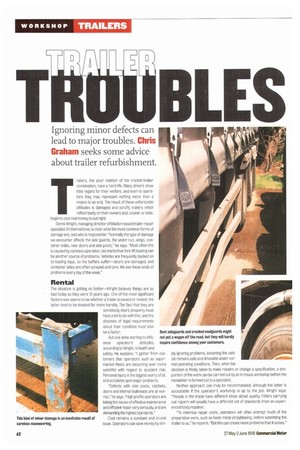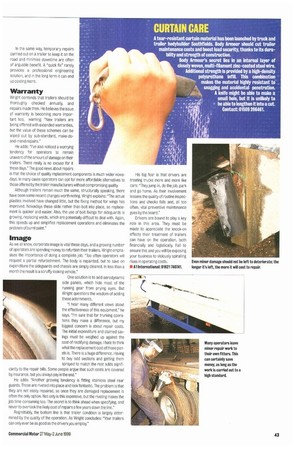Ignoring minor defects can lead to major troubles. Chris Graham seeks some advice about trailer refurbishment.
Page 44

Page 45

If you've noticed an error in this article please click here to report it so we can fix it.
Traliers, the poor relation of the tractor/trailer combination, have a hard life. Many drivers show little regard for their welfare, and even to operators they may represent nothing more than a means to an end. The result of these unfortunate attitudes is damaged and scruffy trailers which reflect badly on their owners and, sooner or later. begin to cost real money to put right.
Derek Wright, managing director of Malden-based trailer repair specialist Al International, is clear what the most common forms of damage are, and who is responslble: "Normally the type of damage we encounter affects the side guards, the under-run, wings, container sides, rear doors and side posts,' he says. "Most often this is caused by careless operation, but inattentive fork-lift loading can be another source of problems. Vehicles are frequently backed on to loading bays, so the buffers suffer—doors are damaged, and Container sides are often scraped and torn. We see these kinds of problems every day of the week."
Rental
The situation is getting no better—Wright believes things are as bad today as they were 10 years ago. One of the most significant factors now seems to be whether a trailer is owned or rented: the latter tend to be treated far more harshly. The fact that they are somebody else's property must have a lot to do with this, and the absence of legal requirements about their condition must also be a factor.
But one area starting to influ ence operators' attitudes, according to Wright, is health and safety. lie explains: "I gather from customers that operators such as supermarket fleets are becoming ever more watchful with regard to accident risk. Personal injury is the biggest worry of all, and accidents spell major problems.
"Defects with side posts, ratchets, doors and internai bulkheads are all worries," he says. "Ugh-profile operators are taking the issues of effective maintenance and efficient repair very seriously, and are demanding the highest standards."
Cost remains a constant and crucial issue. Operators can save money by sim ply ignoring problems, assuming the vehicle remains safe and driveable under normal operating conditions. Then, when the decision is finally taken to make repairs or change a specification, a proportion of the work can be carried out by an in-house workshop before the remainder is farmed out to a specialist.
Neither approach can truly be recommended, although the latter is acceptable if the operator's workshop is up to the job. Wright says: "People in the trade have different ideas about quality. Fitters carrying Out repairs will usually have a different set of standards from an experienced body repairer.
"To minimise repair costs, operators will often attempt much of the preparation work, such as basic metal straightening, before submitting the trailer to us," he reports. "But this can create more problems than it solves." In the same way, temporary repairs carried out on a trailer to keep it on the road and minimise downtime are often of arguable benefit. A "quick fix" rarely provides a professional engineering solution, and in the long term it can end up costing more.
Warranty
Wright contends that trailers should be thoroughly checked annually, and repairs made then. He believes the issue of warranty is becoming more important too, warning: "New trailers are being offered with extended warranties, but the value of these schemes can be wiped out by sub-standard, make-doand-mend repairs."
He adds: "I've also noticed a worrying tendency for operators to remain unaware of the amount of damage on their trailers. There really is no excuse for it these days." The good news about repairs is that the choice of quality replacement components is much wider nowadays. In many cases operators can opt for more affordable alternatives to those offered by the trailer manufacturers without compromising quality Although trailers remain much the same, structurally speaking, there have been some recent changes worth noting. Wright explains: "The actual plastics involved have changed little, but the fixing method for wings has improved. Nowadays these slide rather than bolt into place, so replacement is quicker and easier. Also, the use of bolt fixings for sideguards is growing, replacing welds, which are potentially difficult to deal with. Again, this speeds up and simplifies replacement operations and eliminates the problem of burnt paint."
Image
As we all know, corporate image is vital these days, and a growing number of operators are spending money to refurbish their trailers. Wright emphasises the importance of doing a complete job: "Too often operators will request a partial refurbishment. The body is repainted, but to save on expenditure the sideguards and chassis are simply cleaned. In less than a month the result is a scruffy-looking vehicle."
One solution is to add aerodynamic side panels, which hide most of the running gear from prying eyes. But Wright questions the wisdom of adding these adornments.
"I hear many different views about the effectiveness of this equipment," he says. "rm sure that for trunking operations they make a difference, but my biggest concern is about repair costs. The initial expenditure and claimed savings must be weighed up against the cost of rectifying damage. I hate to think what the replacement cost of those panels is. There is a huge difference. Having to buy odd sections and getting them sprayed to match the rest adds significantly to the repair bills. Some people argue that such costs are covered by insurance, but you always pay in the end."
He adds: "Another growing tendency is fitting stainless steel rear guards. These are riveted into place and look fantastic. The problem is that they are not easily repaired, so once they are damaged replacement is often the only option. Not only is this expensive, but the riveting makes the job time-consuming too. The secret is to think ahead when specifying, and never to overlook the likely cost of repairs a few years down the line."
Regrettably, the bottom line is that trailer condition is largely determined by the quality of the operation. As Wright concludes: "Your trailers can only ever be as good as the drivers you employ." His big fear is that drivers are treating trucks more and more like cars: "They jump in, do the job, park and go home. As their involvement lessens the quality of routine inspections and checks falls and, all too often, vital preventive maintenance goes by the board."
Drivers are bound to play a key role in this area. They must be made to appreciate the knock-on effects their treatment of trailers can have on the operation, both financially and logistically. Fail to ensure this and you will be exposing your business to viciously spiralling rises in operating costs. Even minor damage should not be left to deteriorate: the
II Al International: 01621740741. longer it's left, the more it will cost to repair.
CURTAIN CARE
A tear-resistant curtain material has been launched by truck and trailer bodybuilder Southfields. Body Armour should cut trailer maintenance costs and boost load security, thanks to its durability and strength of construction.
Body Armour's secret lies in an internal layer of closely woven, multi-filament zinc-coated steel wire. Additional strength is provided by a high-density polyurethane infill. This combination makes the material highly resistant to A snagging and accidental penetration. A04 A knife might be able to make a small hole, but it is unlikely to be able to lengthen it into a cut. Contact 01509 266461.
























































































































